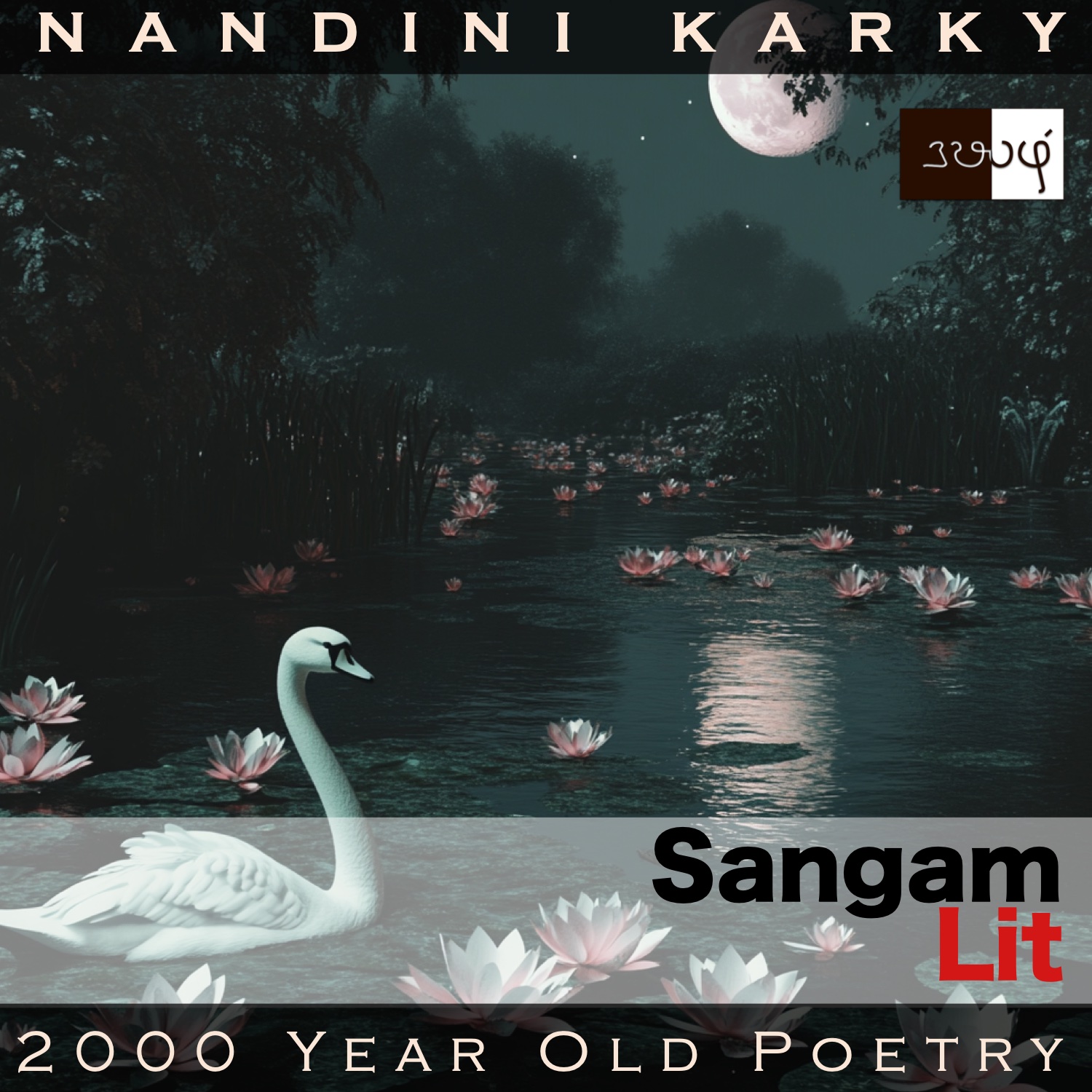Podcast: Play in new window | Download
Subscribe: Apple Podcasts | Spotify | Amazon Music | Android | iHeartRadio | TuneIn | RSS | More
In this episode, we listen to many sounds that arise in a town, as depicted in Sangam Literary work, Kalithogai 70, penned by Maruthan Ilanaakanaar. The verse is situated in the ‘Marutham’ or ‘Farmlands landscape’ and portrays the formidable foes of sleep.

மணி நிற மலர்ப் பொய்கை, மகிழ்ந்து ஆடும் அன்னம் தன்
அணி மிகு சேவலை அகல் அடை மறைத்தென,
கதுமென காணாது கலங்கி, அம் மடப் பெடை
மதி நிழல் நீருள் கண்டு, அது என உவந்து ஓடி,
துன்னத் தன் எதிர் வரூஉம் துணை கண்டு, மிக நாணி,
பல் மலரிடைப் புகூஉம் பழனம் சேர் ஊர! கேள்:
நலம் நீப்பத் துறந்து எம்மை, நல்காய் நீ விடுதலின்,
பல நாளும் படாத கண், பாயல் கொண்டு இயைபவால்;
துணை மலர்க் கோதையார் வைகலும் பாராட்ட,
மண மனைத் ததும்பும் நின் மண முழ வந்து எடுப்புமே
அகல நீ துறத்தலின், அழுது ஓவா உண்கண், எம்
புதல்வனை மெய் தீண்ட, பொருந்துதல் இயைபவால்;
நினக்கு ஒத்த நல்லாரை நெடு நகர்த் தந்து, நின்
தமர் பாடும் துணங்கையுள் அரவம் வந்து எடுப்புமே
வாராய் நீ துறத்தலின், வருந்திய எமக்கு, ஆங்கே
நீர் இதழ் புலராக் கண் இமை கூம்ப இயைபவால்;
நேர் இழை நல்லாரை நெடு நகர்த் தந்து, நின்
தேர் பூண்ட நெடு நல் மான் தெள் மணி வந்து எடுப்புமே
என ஆங்கு
மெல்லியான் செவிமுதல் மேல்வந்தான் காலை போல்,
எல்லாம் துயிலோ எடுப்புக நின் பெண்டிர்
இல்லின் எழீஇய யாழ் தழீஇ, கல்லா வாய்ப்
பாணன் புகுதராக்கால்!
In this verse, the confidante speaks in the voice of the lady. The words can be translated as follows:
“In a sapphire-hued pond, a swan that was frolicking, suddenly when not seeing its handsome mate, because it was hidden by a huge leaf, becomes anxious. Such is the naivety of that female! Seeing the shadow of the moon in the water, thinking that its beloved is there, it rushes with joy thither, and then seeing its true mate appear in front of it, with much shame, hides behind the many flowers in your town, filled with fields, O lord! Listen:
Making my beauty fade, when you abandoned me, without rendering your grace, my eyes that hadn’t seen sleep for days many, would have closed and rested. But the sounds of women, wearing garlands with flower pairs, singing your praises ceaselessly, arising from the joyous home, proclaim your union and woke me up with a start!
As you forgot me for long, my kohl-streaked eyes that cried endlessly, after feeling the caress of my son, would have closed and rested; But when you brought the women you desire to the tall mansion and danced the ‘thunangai’ with them, those sounds woke me up with a start!
When you had forsaken me by not coming here, I was filled with worry. These eyelids of mine which would never dry up may have closed and rested. But when you brought the women, wearing well-etched ornaments, to the tall mansion, the sounds of the tinkling bells on your fine horses tied to your chariot woke me up with a start!
And so, like the sounds of a mighty king arriving which falls on the ears of a weak one, such things wake me up from sleep. Let it be so! As long as that foolish bard, who played the strings in the abodes of your women, does not enter this home!”
Time to delve into the details. The verse is situated in the context of a love-quarrel between the man and the lady, owing to the man’s seeking of courtesans and these words are rendered by the confidante, in the voice of the lady, to drive home a sharp message to the man. The confidante starts by sketching the man’s town, and like the previous verse, she resorts to the scene of two swans in a pond, but the difference is, now, it’s night, and when the female swan looks up, it’s unable to see its mate as the other was hidden by a huge leaf. Startled, it looks around here and there, and then spots the shadow of the moon in the pond. Thinking that the reflection is its mate, the swan rushes towards it and then when it sees its real mate appear before it, it buries its head amidst the flowers that bloom. Here’s a classic case of projecting human emotions on animals, a favourite trope of poets, especially poets from this era. After sketching the man’s town so, the confidante, speaking in the voice of the lady, talks about how although there was a slight possibility of her sleepless, crying eyes finding sleep, when she embraced her son or when overcome by the lack of sleep and the tiredness of crying, but that possibility was obliterated when sounds of the courtesan’s singing praises of the man, sounds of the man dancing with them in the mansion, and the sounds of the bells on the man’s horses, as he took the courtesans to a tall mansion, fell on the lady’s ears.
The confidante in the voice of the lady concludes saying, ‘Yes, these sounds do fall on my ears and wake me up. I can bear with all that, but one thing I can’t bear is if the bard, who plays on lutes in the homes of those courtesans, decides to come here to our home’. It’s a case of the confidante refusing entry to the man into the lady’s home. The hedonistic lifestyle in a farmland town is highlighted in this verse, which rings with the sounds of the man’s pleasure-seeking and the lady’s pain!




Share your thoughts...